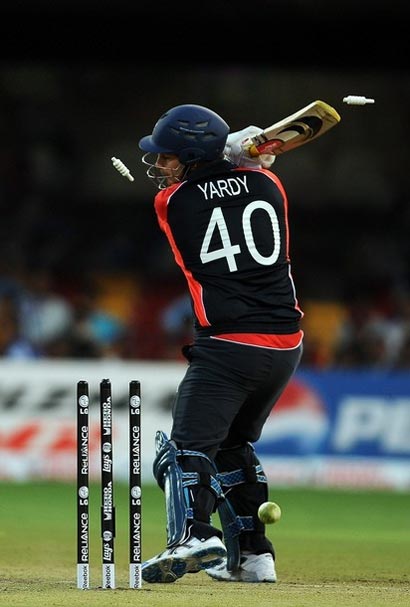Depression forces England spinner Yardy to quit the World Cup

England lost a fourth player from their original World Cup squad with the shock withdrawal of Mike Yardy, who is suffering from depression.
Just two days before the quarter-final against Sri Lanka, Yardy became the second England cricketer to admit to having the illness after Marcus Trescothick’s well-documented problems and immediately flew home to his wife and two children in Brighton.
His departure stunned the England camp, with the majority of the players having no idea that the Sussex captain had suffered from depression for ‘a prolonged period’.
The 30-year-old left-arm spinner follows the injured Kevin Pietersen, Stuart Broad and Ajmal Shahzad in being forced to return home during what has been a largely ill-fated World Cup campaign.
But it will be Yardy’s exit that is the most striking because he has been brave enough to admit, unusually among sportsmen, to having an illness that is widely misunderstood.
Yardy, who saw James Tredwell preferred to him for England’s last group game against the West Indies, practised as usual on Wednesday before seeking a meeting with England’s management.
Then, after consultation with the medical team, it was decided that he should go home immediately.
‘Leaving at this stage of a World Cup was a very difficult decision to make,’ said Yardy in a statement.
‘But I felt it was the only sensible option for me and I wanted to be honest about the reason behind that decision.
‘I wish the squad all the very best for Saturday and I would appreciate some privacy while I spend time with my family ahead of what will hopefully be a successful season for Sussex.’
Yardy will be offered the support networks put into place by the ECB and the Professional Cricketers’ Association and was due to be greeted at Heathrow Airport on his return home last night by managing director of England cricket Hugh Morris.
‘I would like to offer my full support to Michael on behalf of everyone involved with the England team and the ECB,’ said Morris.
‘He has been an integral part of our one-day set-up but our priority now is to ensure that he can spend time recovering.’
Leading sports psychologist Carole Seheult said: ‘There is absolutely no reason why somebody should not return to high-level sport.
No reason at all – and especially if they get the right treatment, the right help, the right type of support and the right kind of understanding from the sport as well.
‘If the sport wants the best out of their talent then they need to look after their resources.’ Daily Mail reports.
Courtesy: Ada Derana – Pix by
Latest Headlines in Sri Lanka
- Sri Lanka and United States discuss Economic Support and Reforms April 19, 2024
- Israeli missile strikes Iran amid escalating Middle East tensions April 19, 2024
- President says he will build a Sri Lanka that the youth aspire to April 19, 2024
- NPP presents 7-point pledge on Easter Sunday Attack to Cardinal Ranjith April 18, 2024
- Dialog Axiata to acquire Bharti Airtel’s telecom operations in Sri Lanka April 18, 2024


